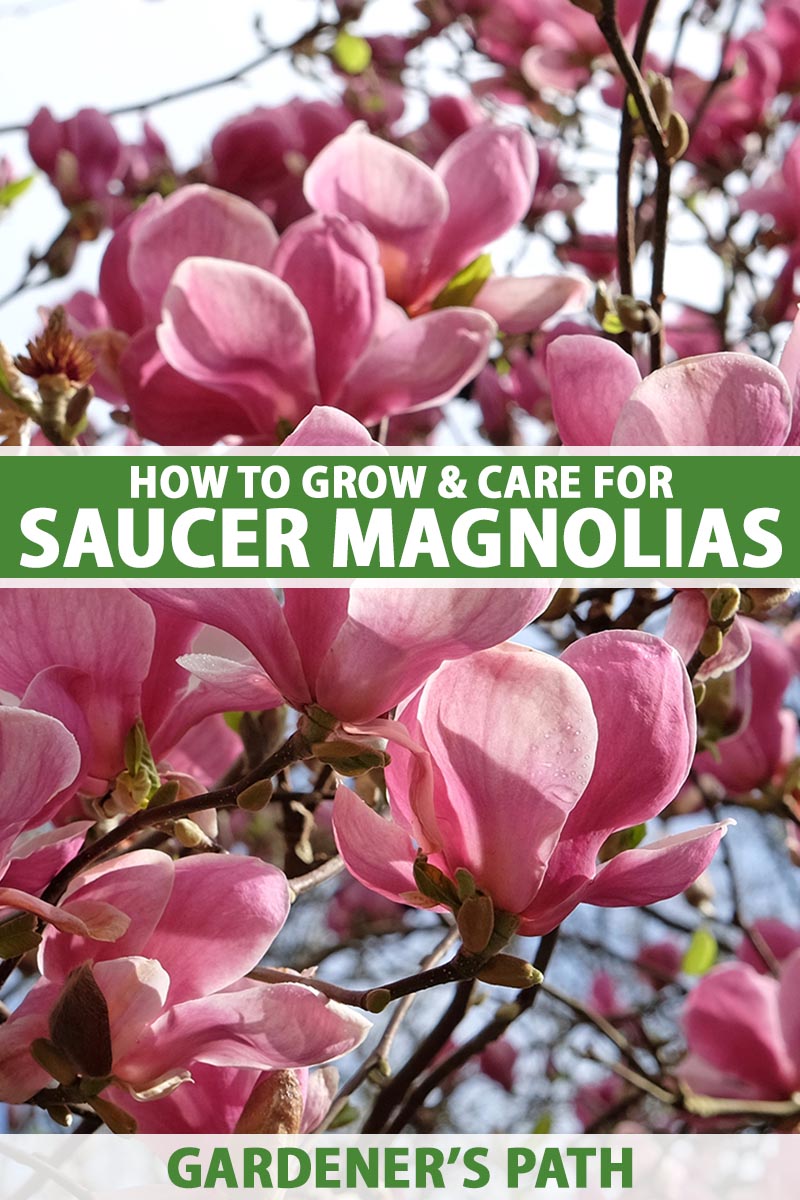[ad_1]
Magnolia x soulangeana
The most well-liked deciduous magnolia, Magnolia x soulangeana, produces heaps and heaps of enormous purple, pastel pink, and white blossoms on naked branches within the spring.
But it surely’s not a tree that happens in nature. It’s a hybrid cross of two not-so-popular species. The consequence is likely one of the finest magnolia choices on the market: the saucer magnolia.
What makes this hybrid so improbable? It produces an nearly unreal variety of blossoms. The tree is so densely robed in elegant flowers which you can’t even see the branches beneath.
It maintains a petite dimension in comparison with different species within the genus, averaging round 20 ft tall, and it’s comparatively untroubled by ailments and pests.
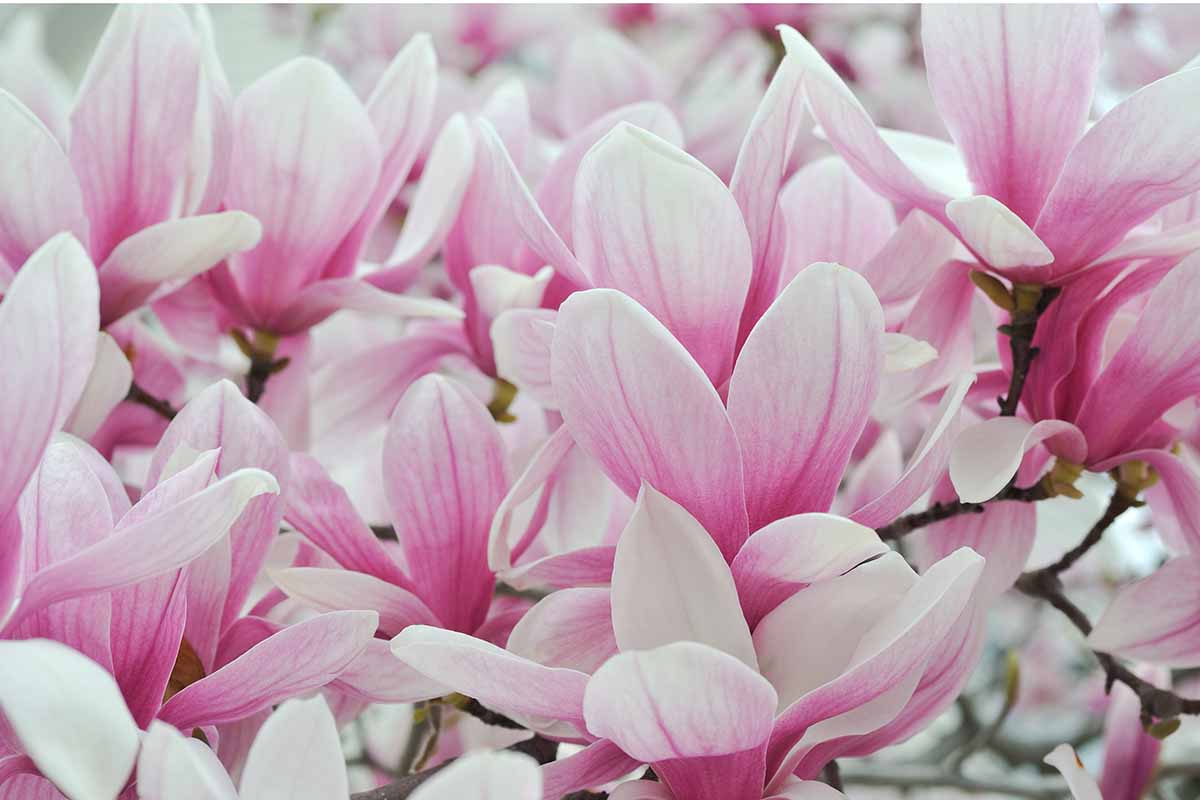
We hyperlink to distributors that will help you discover related merchandise. In case you purchase from one in every of our hyperlinks, we could earn a fee.
Want a focus within the backyard however lack area? Need one thing that may produce an excellent present with out a lot work in your half? On the lookout for a tree that isn’t going to want fixed pampering?
The reply to all three of these questions is a saucer magnolia.
In our information to rising magnolias, we focus on how one can domesticate these bushes in your panorama. On this information, we’ll zero-in on the saucer magnolia, and how one can make this tree thrive.
Right here’s what I’ll cowl:
It at all times helps to grasp a bit a couple of tree’s historical past earlier than you leap into rising it. That method, you possibly can have a good suggestion of what the plant wants. Let’s go over that first.
Cultivation and Historical past
Saucer magnolias (Magnolia x soulangeana) don’t seem naturally within the wild.
They’re cultivated hybrid crosses of two magnolia species: lilytree (M. denudata) and tulip magnolia (M. liliiflora).
The Yulan, Chinese language, or lilytree (M. denudata syn. M. heptapeta) magnolia is native to central and japanese China and has been cultivated for tons of of years, with data of specimens planted in Buddhist temples courting again to 600 AD. It arrived in England in 1780.
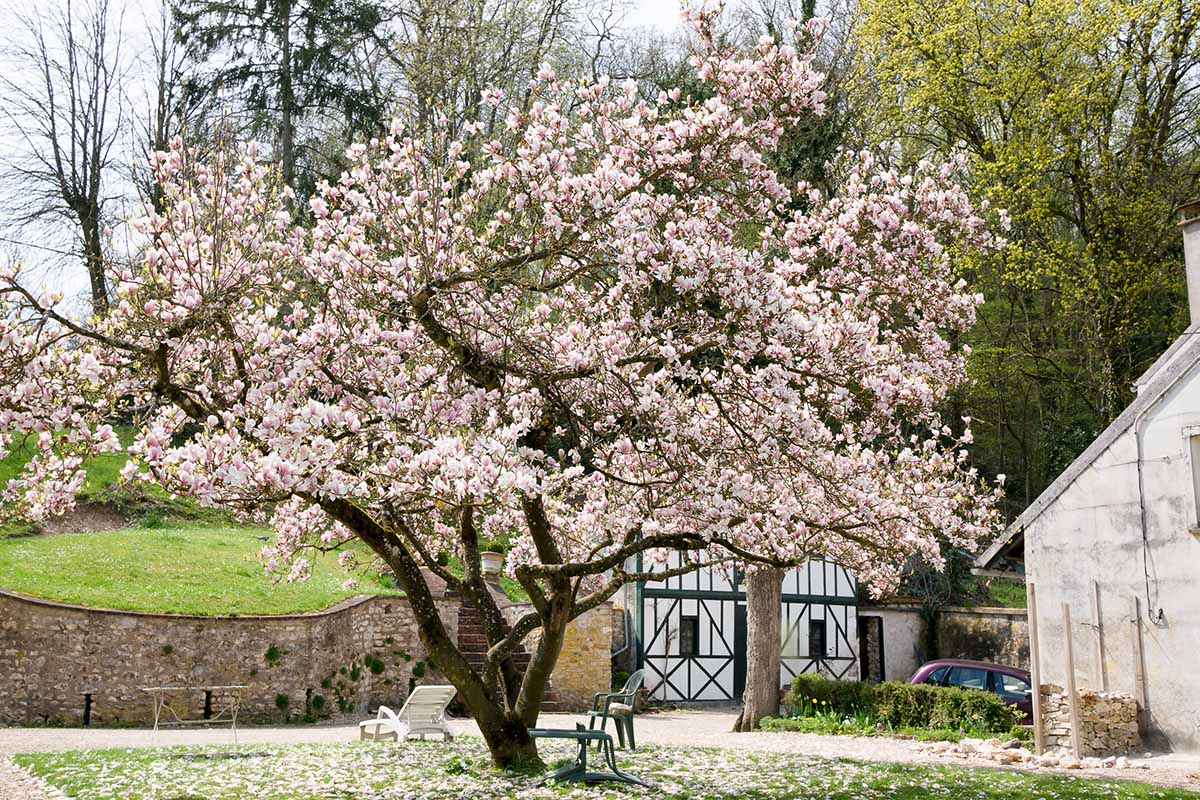
M. denudata bushes develop as much as 30 ft tall and produce a lot of citrus-scented, thick-petaled white flowers.
The Mulan, purple, purple, lily, or tulip magnolia (M. liliiflora) hails from southwest China and has been in style in Japan for hundreds of years, although it’s not native there. It was launched to Britain in 1861 from Japan.
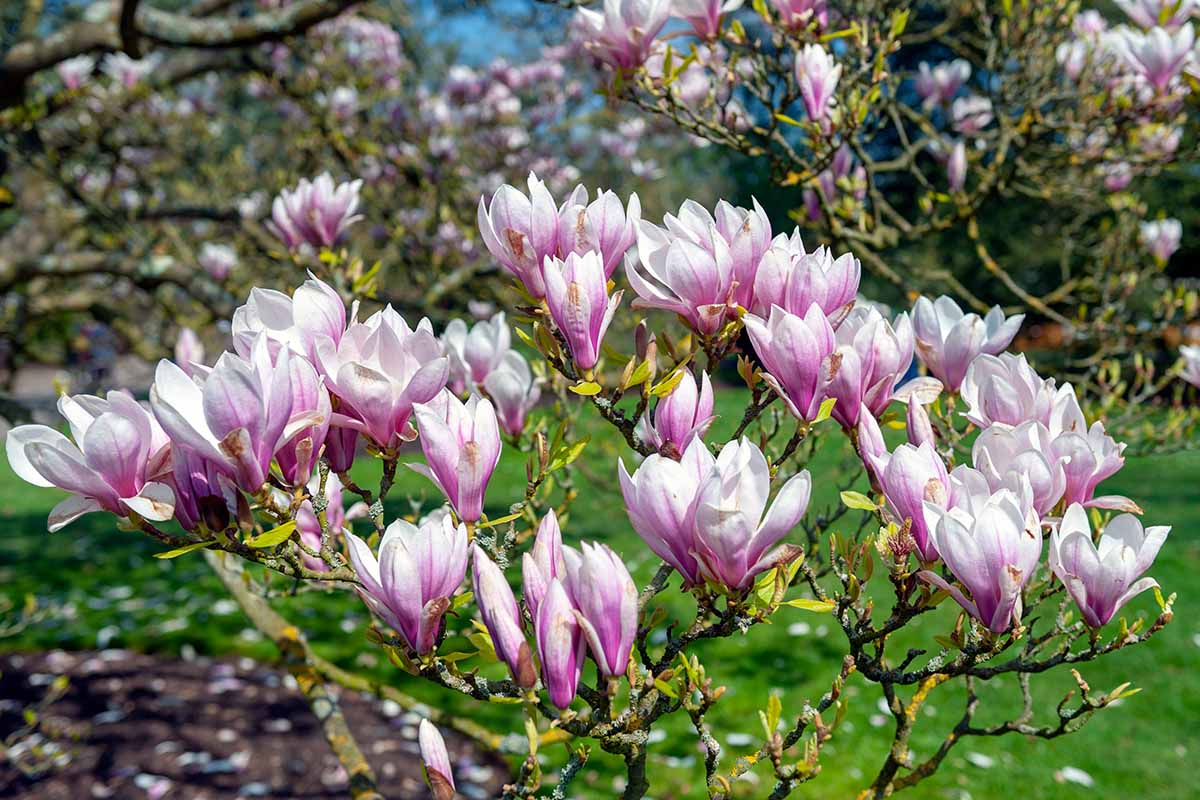
It’s smaller than many different species, at simply 12 ft tall or so. The flowers are pinkish-purple.
Saucer magnolias mix the very best options of each species.
They’re small in stature at about 20 ft tall and 15 ft extensive at maturity. Within the early spring in Zones 5 to 9, massive white, pink, and maroon flowers bud out on the stems and open up with a cupped or globular form, measuring as much as 14 inches in diameter.
The flower shade, dimension, and form varies relying on the cultivar. The one function all of them have in frequent is that the bushes are extraordinarily floriferous. After they’re in bloom, you possibly can hardly even see the branches beneath.
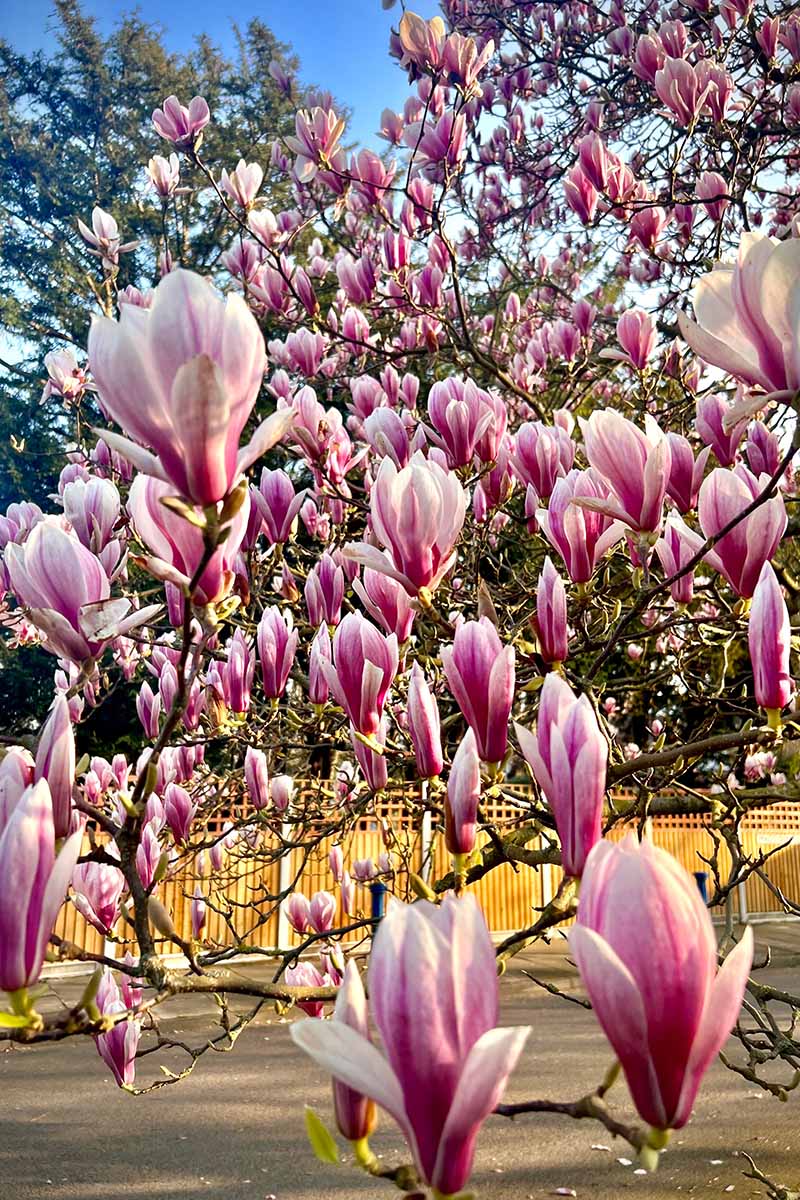
After the flowers fade, they’re adopted by alternate, elongated leaves. Beneath all that’s easy, grey bark.
After they’re younger, the bushes are likely to develop in fairly an upright behavior, however they tackle a rounded or oval form as they age.
We now have French botanist and biologist Etienne Soulange-Bodin to thank for this flowering marvel. He tinkered round with the mum or dad species and ultimately bred and named the saucer magnolia in 1826.
He was impressed with its prolific flowering, and it shortly turned in style in France, England, and North America. Now, there are dozens of cultivars accessible and you will discover this tree rising in landscapes and parks virtually all over the place that has the suitable local weather.
Saucer Magnolia Propagation
As a hybrid, it’s finest to not attempt to propagate saucer magnolia from seed because it gained’t develop true and your persistence is unlikely to be rewarded.

Shopping for a plant from a nursery for transplanting or propagating through stem cuttings are each dependable methods to get began.
From Cuttings
Propagating stem cuttings creates a precise clone of the mum or dad plant, so in case you love a selected tree, you possibly can take a number of softwood cuttings and recreate it.
Within the spring simply after the leaves open, discover a department that’s mushy and pliable with new development and wholesome foliage. Lower about eight inches in size with the tip at a 45-degree angle.
Take away all of the leaves besides the highest two. If each leaves are comparatively massive when in comparison with different foliage on the tree, minimize them in half vertically. An excessive amount of foliage will drain the restricted sources within the reducing earlier than it could possibly develop the roots.
Fill a gallon-sized container with a seed-starting combination. Dip the tip of the reducing in rooting hormone and insert it into the middle of the container about two inches deep.
Moisten the medium effectively and place the container in an space with brilliant, oblique gentle. In case you dwell in a dry local weather, it could possibly assist to tent some clear plastic over the reducing to retain humidity. Don’t let the plastic contact the stem reducing, although. Prop it up with a chopstick or different kind of help if vital.
Preserve the soil moist and watch for the reducing to develop new development. When new development is clear, you possibly can transplant the rooted reducing into the backyard within the spring or summer time.
Transplanting
Buying a saucer magnolia out of your native nursery or backyard heart isn’t as low cost as rising from cuttings, however you get a headstart, and it’s actually a lot simpler.
Plan to purchase and transplant your younger tree within the spring. Many bushes do finest if you plant them within the fall, however magnolias choose to be transplanted within the spring.
Whenever you deliver house your potted tree, dig a gap that’s the identical depth and twice as extensive because the container the tree is at the moment rising in.
Take away the plant from the container and gently loosen up the roots. You need them to develop out and away from the middle, not circle round, which could occur if the plant has been rising within the container for some time.
Spreading the roots helps stop girdling the tree, which is when the roots develop in a circle at or beneath soil stage, and might ultimately strangle the tree.
Set the plant within the floor on the similar top because it was within the container and fill in across the roots with soil. Water effectively and add extra soil, if vital.
The extra compact saucer magnolia cultivars corresponding to ‘Brozzoni,’ ‘Lilliputian,’ and ‘Verbanica’ might be grown in containers.
Select a big container, one thing ten gallons or greater, that has a number of drainage holes. Be certain it’s received some weight to it so that you don’t have to fret about your tree tipping over.
Fill the container with a regular potting combine. Something that drains effectively and is water retentive will work.

FoxFarm Ocean Forest
I’m keen on FoxFarm Ocean Forest potting soil, which you will discover in 12 quart luggage accessible through Amazon.
Take away the plant from its rising container and loosen up the foundation. Set it within the new container and backfill with the potting soil.
You need the tree to be sitting about the identical top it was within the rising container or possibly an inch or two increased. Water effectively and add extra soil if it settles.
The way to Develop Saucer Magnolias
Saucer magnolias develop effectively in full solar to half shade places in Zones 5 to 9, although shade will cut back flowering.
Saucer magnolias are fairly tolerant of situations that hassle different magnolia species, like wind and alkaline soil.
The branches don’t break as simply as some species and although they like organically-rich, well-draining, barely acidic to impartial soil with a pH between 6.0 and seven.5, they’ll tolerate a pH as much as 8.0.
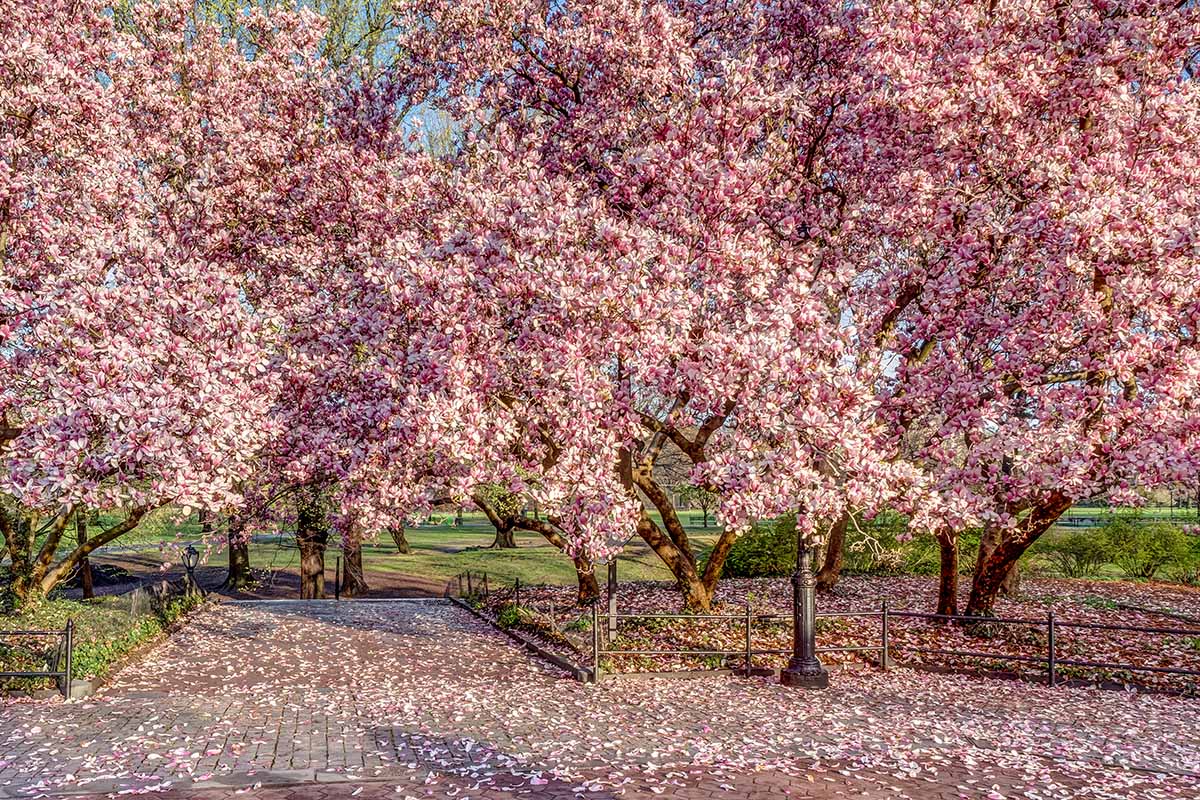
These bushes do finest in areas with constantly moist soil. Any extremes on both finish of the spectrum, whether or not that’s too dry or soggy and waterlogged, will stress or kill the tree.
Meaning you’ll must irrigate if Mom Nature doesn’t present the required moisture. Anytime the soil begins to dry out, add water till it looks like a well-wrung-out sponge.
It’s particularly vital to remain on prime of watering for the primary 5 years of the plant’s life. After that, it could possibly tolerate a bit extra variance.
Containers dry out quicker than floor soil, so that you’ll must maintain an in depth eye on the soil moisture, particularly throughout dry spells.
Now, we now have to speak concerning the heartbreaking a part of rising this plant. After ready patiently all winter lengthy, in early spring the buds swell and the flowers open. Then alongside comes a late frost, and increase. The flowers are useless, and it’s important to miss out on this 12 months’s show.
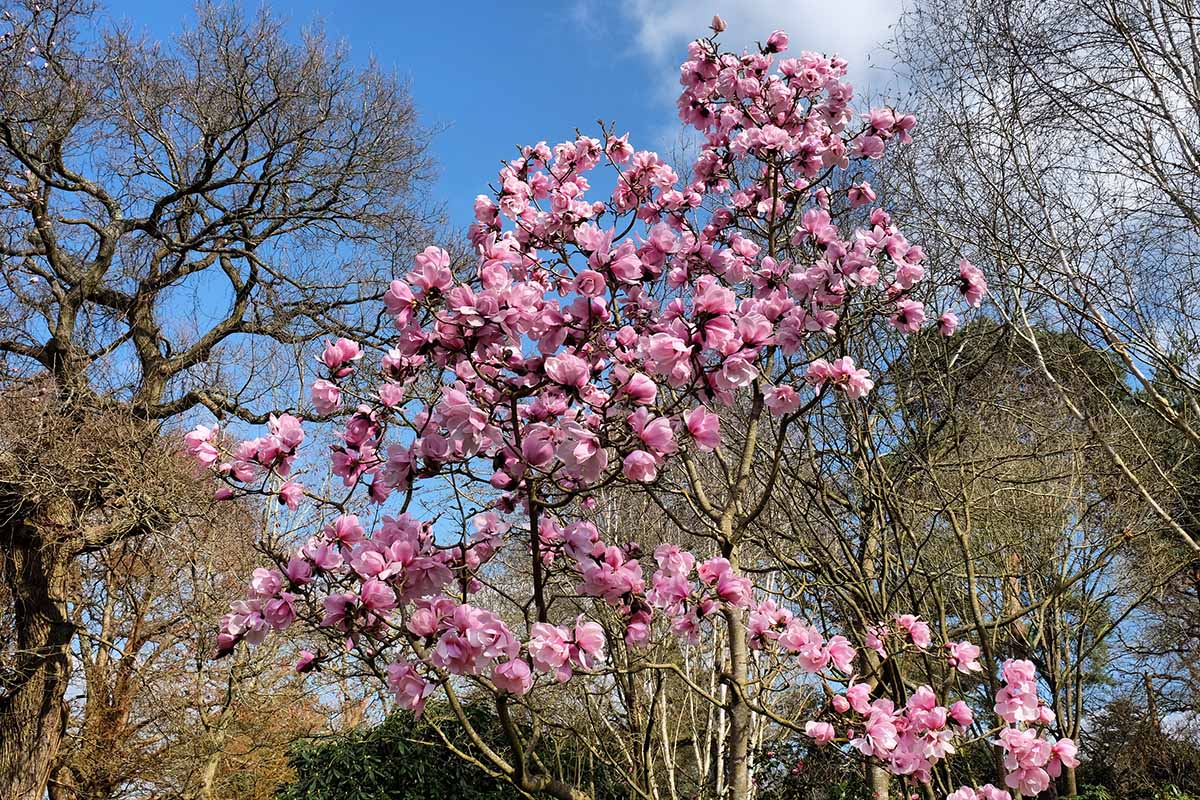
There isn’t a lot you are able to do to stop this aside from choose one of many cultivars that bud out a bit later within the spring in case your space is vulnerable to late frosts. When you have sufficient frost material and you’ll attain all the tree, you possibly can cowl it to guard the buds and blossoms.
Attempt to keep away from planting subsequent to a brick or cement wall that faces south. This space is often hotter than the encircling space and it’d encourage the flowers to bud out sooner than regular, leaving them uncovered to late frosts.
To encourage a lot of blooms, feed the plant as soon as within the spring every year after flowering with an all-purpose meals.
I attain for Right down to Earth’s All Objective meals as a result of it is available in a compostable field and is made out of good things like bone meal, feather meal, alfalfa meal, and kelp meal.
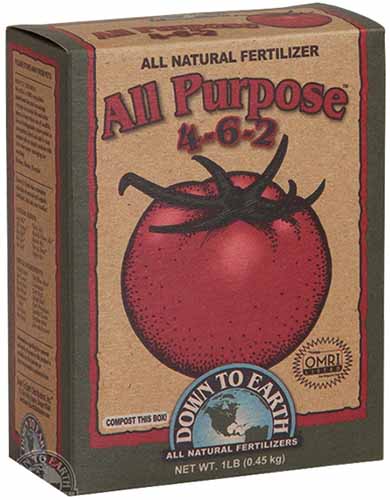
Right down to Earth All Objective Meals
In case you’d prefer to seize some, head to Arbico Organics.
In addition they carry a tree and shrub combine, which comprises related goodies with the addition of 11 strains of mycorrhizal fungi to help wholesome roots.
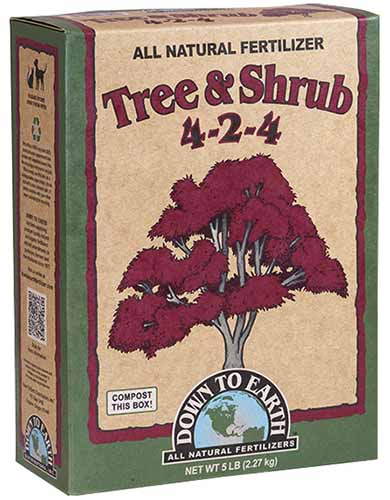
Right down to Earth Tree and Shrub Combine
It’s additionally accessible at Arbico Organics in five- or 15-pound bins.
Rising Ideas
- Develop in full to partial solar.
- Plant in free, wealthy soil.
- Preserve the soil constantly moist.
Pruning and Upkeep
Alright, strap in. We’re about to dive into the advanced world of pruning magnolias. Wait, did I say advanced? I meant to say extremely easy.
You most likely don’t ever must prune your saucer magnolia, until there’s an issue like a damaged department or indicators of illness.
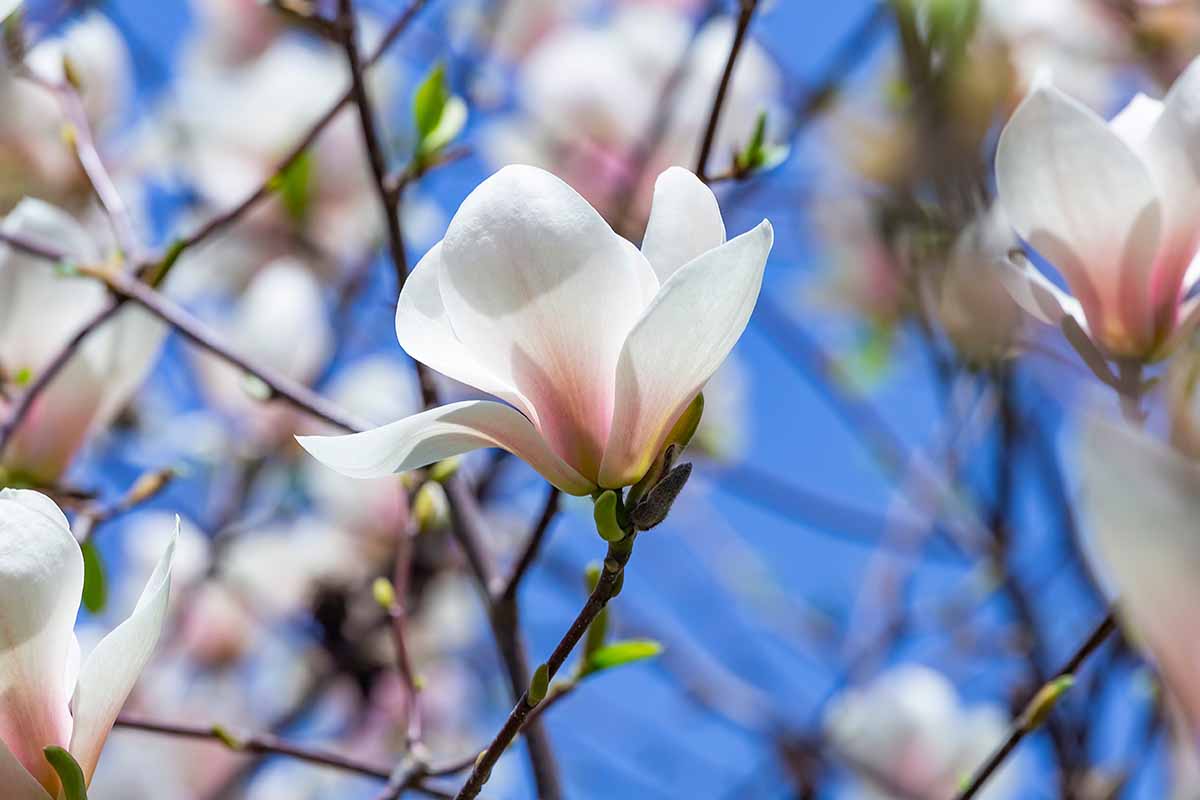
When the bushes are younger, you possibly can prune them to encourage a extra tree-like form if that’s what you favor, since they’ll generally tackle a shrubby look.
In any other case, prune off any diseased or broken branches as you see them.
You don’t even must prune to open up the cover, as you do with some species, until you wish to. The perfect time to prune for form is within the spring earlier than the blossoms open.
If you’re rising your specimen in a container, you shouldn’t must repot, however in case you begin to see roots rising out of the drainage holes, take away the tree (enlist the assistance of a pal) and trim the roots and put the plant again within the pot.
Then, trim the cover a bit to cut back the load on the roots.
Saucer Magnolia Cultivars to Choose
There are a number of in style cultivars that you will discover at backyard facilities and nurseries, however many locations simply carry the ever-popular authentic.
And why not? It’s virtually good; no enchancment wanted.
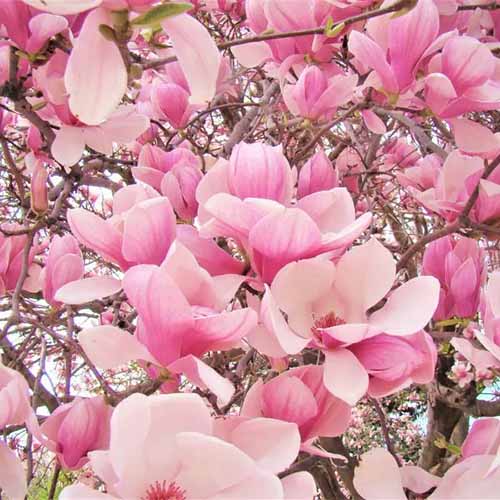
Saucer Magnolia
Pop on over to Nature Hills Nursery for a dwell plant in a #2 or #3 container.
In fact, there’s no motive to not take pleasure in one of many many marvelous cultivars as there are alternatives with white flowers, extra compact shapes, and much more floriferous blooming.
Alba Superba
With massive, closely aromatic flowers which are largely white with only a trace of purple blush on the base, this cultivar is wearing a pale gown of flowers for weeks within the early spring.
It grows to about 20 ft tall, making it very best for smaller spots.
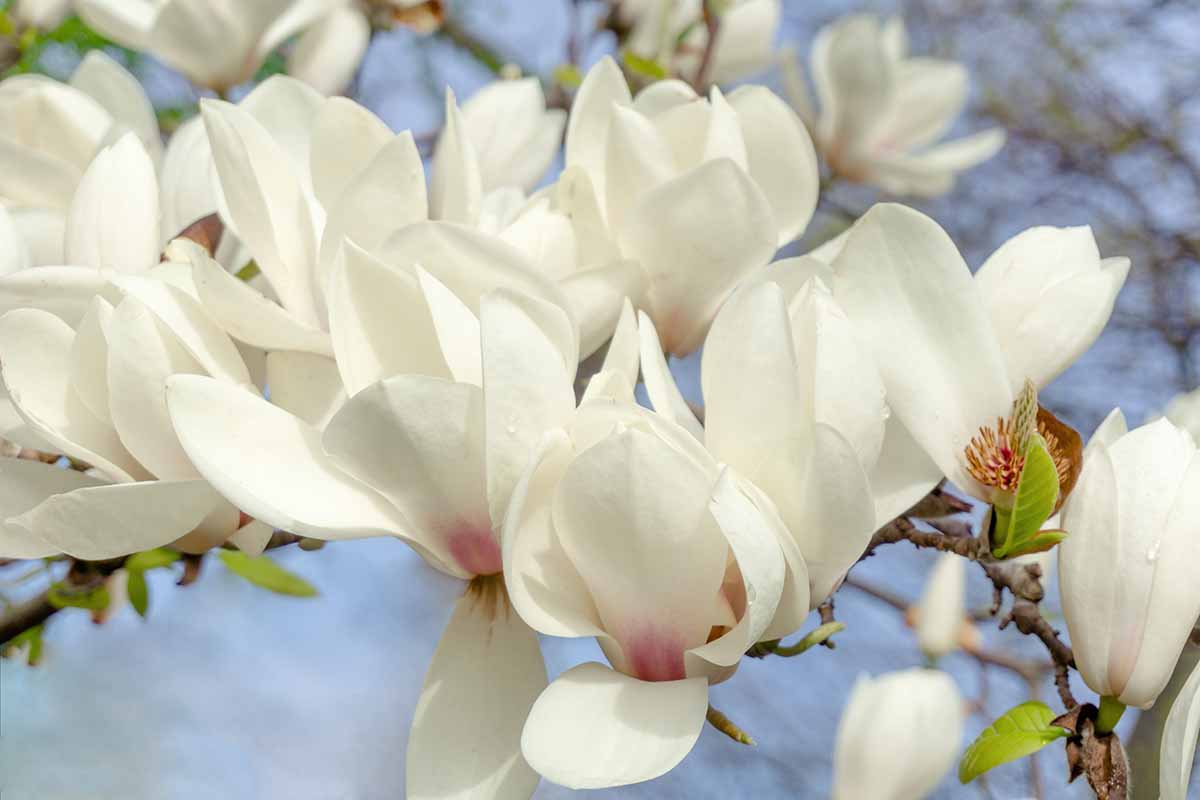
Bred in The Netherlands on the Van Geert Nursery in 1866, This cultivar gained a gentle following and nabbed the Royal Horticultural Society’s Award of Backyard Benefit in 1969.
Alexandrina
‘Alexandrina’ maintains its 20- to 30-foot top with a compact development behavior with none effort in your half.
Simply plant it and watch it develop and bloom with its purplish-pink and white cup-shaped, aromatic flowers.
It was found in France in 1831 and has since diversified primarily based on the place it’s grown. These in Europe have a tendency have paler blooms, whereas North American clones are darker.
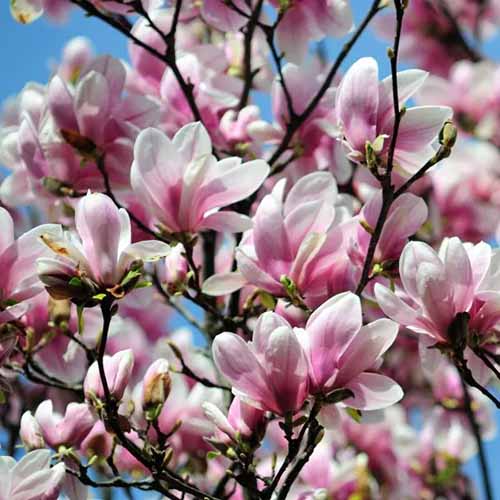
‘Alexandrina’
The one draw back is that this cultivar blooms early, which suggests late frosts can kill the blossoms. Nature Hills Nursery has this versatile magnificence in #1 and #5 containers.
Lennei
A small tree that solely grows to about 15 ft tall, with comparatively small flowers at simply 4 inches in diameter, ‘Lennei’ nonetheless manages to make a giant assertion.
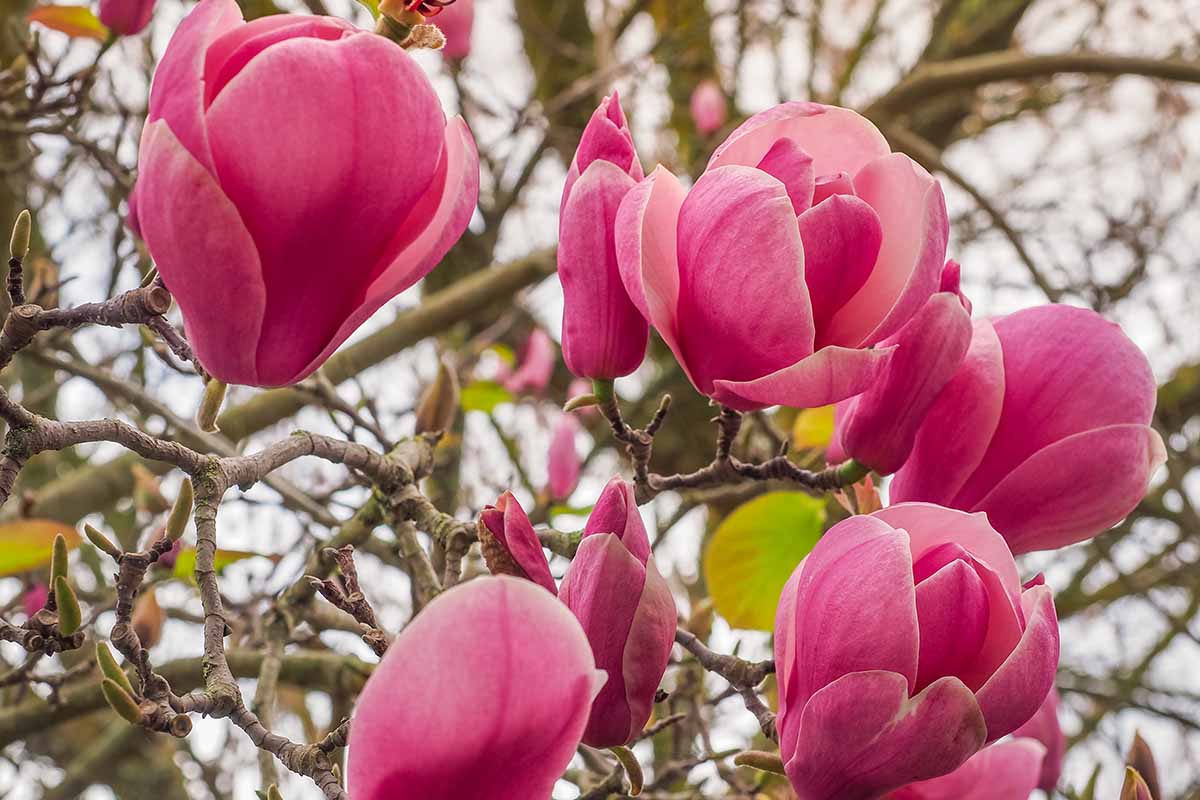
Every blossom is deep purple and rose on the outside and creamy white inside. So the tree seems vibrant pinky-purple because the flowers bud out after which takes on a bicolored look as they open.
The blossoms seem a bit later than different saucer magnolias, they usually may pop up once more in the summertime in smaller numbers.
Managing Pests and Illness
Saucer magnolias are comparatively free from pests and ailments. I’ll, nevertheless, recommend that you simply arrange camp within the spring because the buds are growing.
Arm your self with an air horn and an excellent e book, and blast the squirrels out of the realm, as a result of they may eat the flower buds.
Deer ignore them, although, in order that’s a aid!
There actually aren’t many ailments to fret about and the one insect pest to emphasize about is scale.
Scale
Magnolia scale (Neolecanium cornuparvum) is the biggest scale insect within the US, coming in at almost half an inch in diameter.
It’s a North American native and it doesn’t feed on something however magnolias, with saucer being one in every of its favorites.
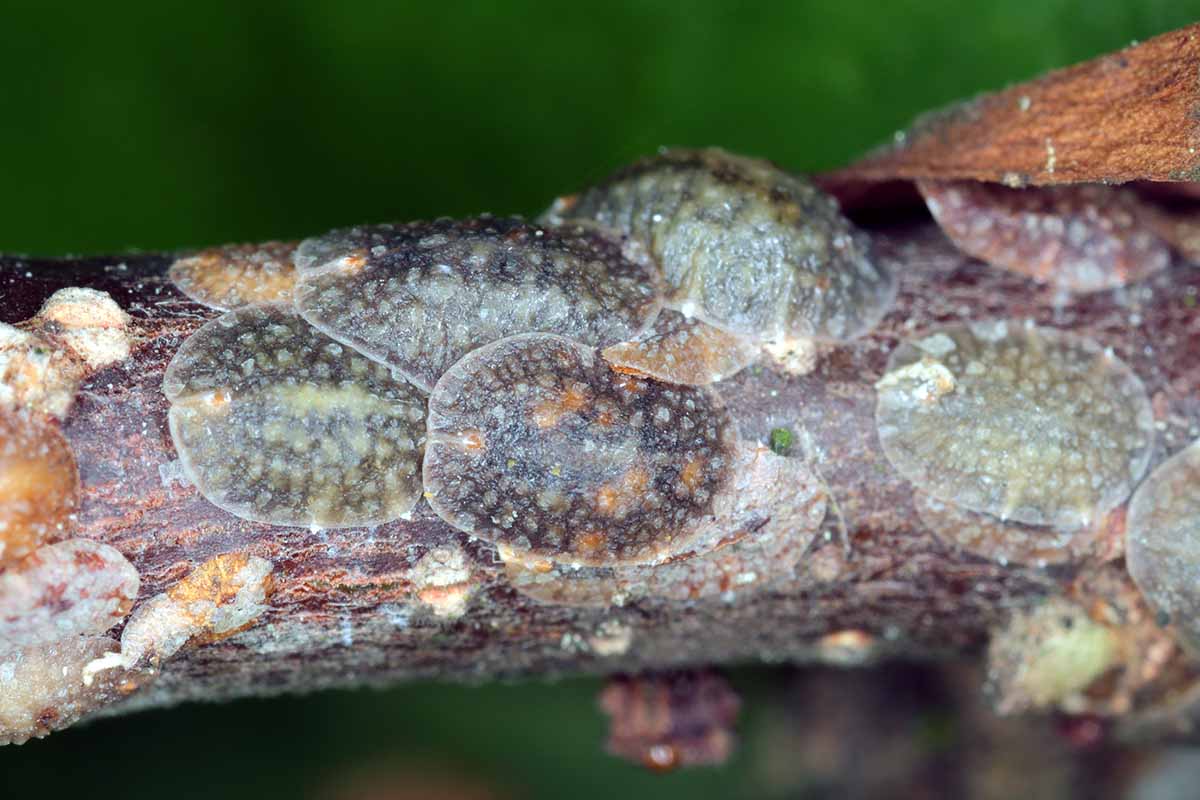
The pests are orange-pink and oval with a white waxy coating, they usually use their sucking mouthparts to attract the sap out of the bushes.
Gentle infestations could stress the tree, inflicting leaf drop or department dieback, however within the case of a heavy infestation, a tree can die.
As they feed, the bugs excrete a sticky substance often called honeydew. Not solely does this drop onto the garden, vehicles, walkways and the rest below the tree, nevertheless it additionally attracts ugly sooty mould.
Making use of a dormant oil earlier than the flowers open may also help offer you a head begin on the season, however true management entails encouraging pure predators like ladybugs and inexperienced lacewings.
A wholesome backyard ought to have an excellent stability of pests and predators, so working in the direction of variety is vital. Within the quick time period, you should buy useful predators to launch into your backyard.
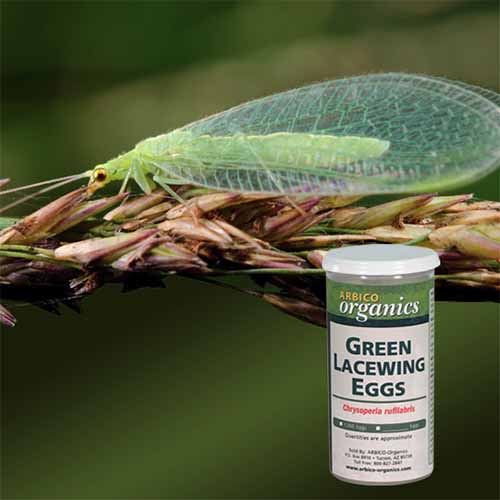
Inexperienced Lacewings
You could find inexperienced lacewings in quite a lot of portions to assist your native populations accessible at Arbico Organics.
It’s attainable to make use of pesticides, however these will kill the nice bugs together with the unhealthy, so you find yourself preventing the issue 12 months after 12 months. It’s finest to order pesticides for extreme infestations that threaten the lifetime of the tree.
Be taught extra about how one can take care of scale bugs in our information.
Tulip-Poplar Weevils
Tulip-poplar weevils (Odontopus calceatus) will chew holes within the leaves, however they aren’t something to fret about.
Simply know that in case your tree has some holey leaves, that’s probably the trigger. If it drives you nuts, deal with them with insecticidal cleaning soap.
Verticillium Wilt
When it comes to illness, verticillium wilt is evil. It could actually quickly kill an in any other case wholesome, mature tree and there’s no remedy.
Search for signs like leaf scorch, unusually heavy seeding, and department dying. As a result of the signs are considerably obscure, minimize off a department and strip the bark. In case you see brown streaks or brown sapwood, you possibly can verify the issue.
In case your tree is contaminated, you possibly can’t reserve it. Take away it to stop infecting different vegetation.
The fungus lives within the soil for years, so don’t plant something there that’s prone to the illness for at the very least ten years. And lots of, many bushes are prone.
The listing of people who aren’t prone is fairly quick. Attempt rising birch, ginkgo, juniper, spruce, pine, dogwood, hawthorn, fig, mulberry, oak, sequoia, and willow bushes as a substitute.
Greatest Makes use of for Saucer Magnolias
The saucer magnolia might be grown in a big container in case you’re prepared to prune constantly. Speak about a focus in your patio!
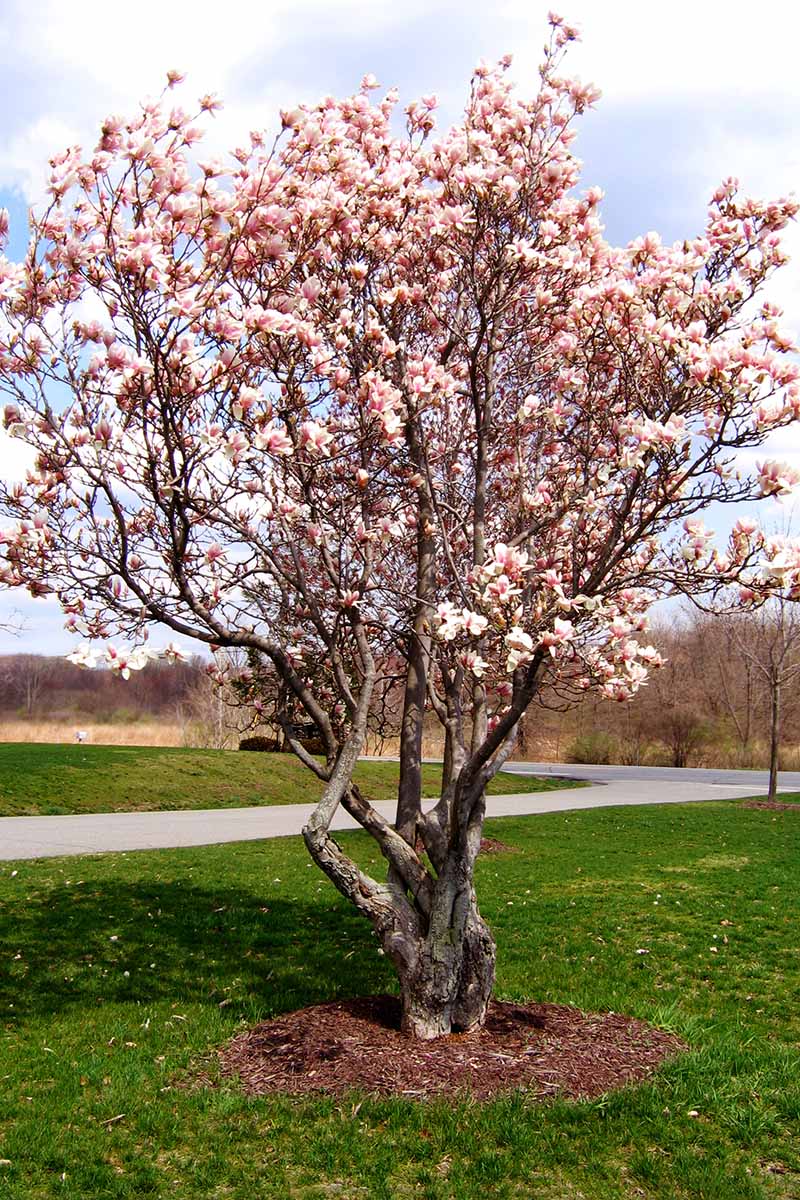
You can even use the tree in espalier, however please, please don’t prepare it in opposition to a wall. The warmth will mirror off the wall and onto the tree and trigger it to flower a bit earlier, leaving it uncovered to killing frosts.
In any other case, the saucer magnolia makes an ideal specimen or background tree within the panorama. The extra compact cultivars could make a significant influence in a small area.
In case you choose to permit the tree to tackle a shrubby look, you possibly can plant a number of as a floriferous hedge for privateness or to create a pure boundary.
Magnolia flowers are additionally edible, and I discover the blooms from saucer magnolias to be among the tastiest.
The deeper the colour, the extra floral and citrus the flavour appears to be. Pickle them, use them in tea, or chop them up so as to add a little bit of shade to salads.
Fast Reference Rising Information
| Plant Sort: | Deciduous flowering tree | Flower/Foliage Coloration: | White, pink, purple/inexperienced |
| Native to: | Cultivated hybrid | Upkeep: | Low |
| Hardiness (USDA Zones): | 5-9 | Tolerance | Alkaline soil, wind |
| Bloom Time: | Spring | Soil Sort: | Free, wealthy |
| Publicity: | Full to partial solar | Soil pH: | 6.0-7.5 |
| Time to Maturity: | 10 years | Soil Drainage: | Nicely-draining |
| Spacing: | 15 ft | Attracts: | Birds, beetles |
| Planting Depth: | Similar depth as rising container | Companion Planting: | Barrenroot, deadnettle, ferns, hostas, ivy, candy woodruff, vinca |
| Top: | As much as 30 ft | Makes use of: | Specimen, container, espalier, hedge, edible |
| Unfold: | As much as 30 ft | Order: | Magnoliales |
| Progress Fee: | Average | Household: | Magnoliaceae |
| Water Wants: | Average | Genus: | Magnolia |
| Widespread Pests and Ailments: | Squirrels, scale, tulip-poplar weevil; verticillium wilt | Species: | x Soulangeana |
Sit Again and Benefit from the Present
It’s onerous to not love a plant that allows you to principally sit again and benefit from the present with little work in your half, however that’s the saucer magnolia for you.
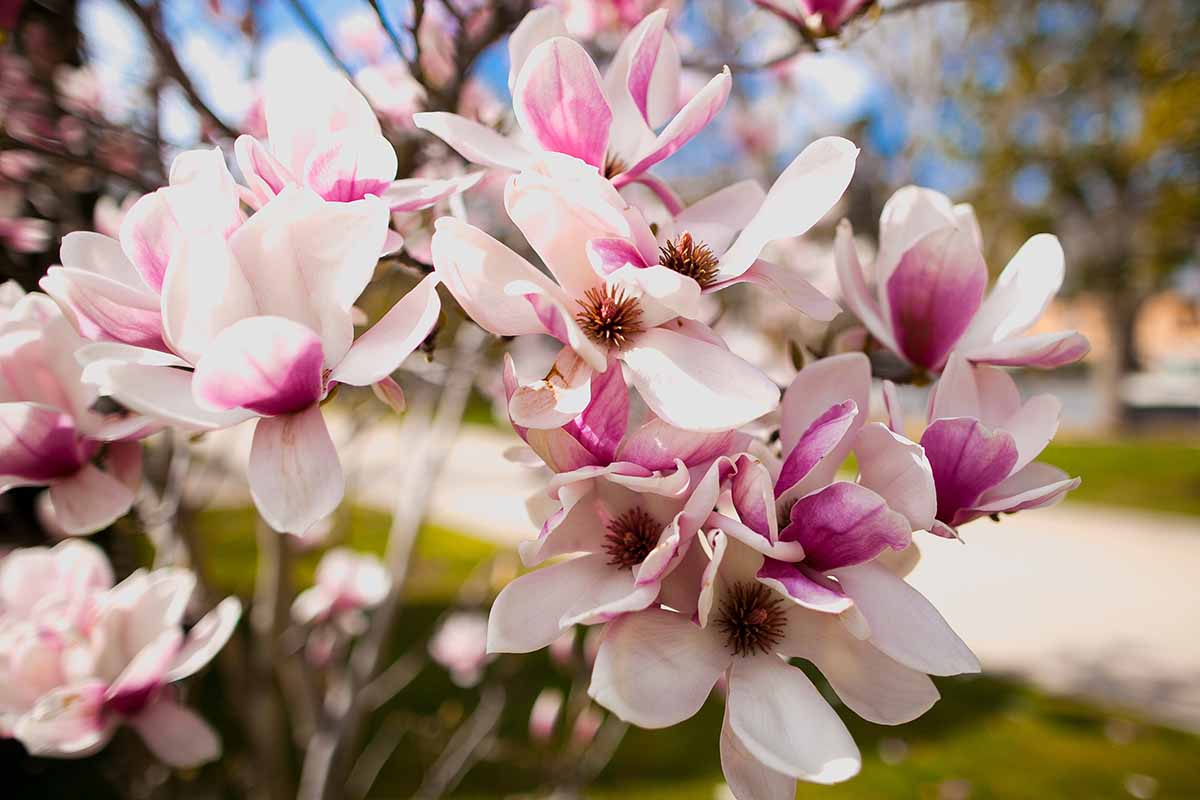
And present me a spring-blooming tree that’s as spectacular. The blossoms are big, colourful, and there are simply so lots of them. I feel the truth that they bloom on naked branches earlier than the leaves emerge makes the show much more spectacular.
What plans do you might have to your new saucer magnolia? Or do you have already got one? What’s your favourite half about it? Tell us within the feedback.
And to be taught extra about rising magnolias, have a learn of those guides subsequent:
[ad_2]



